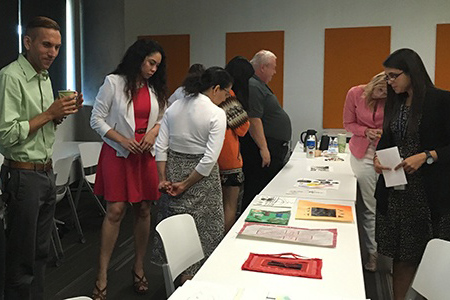“The arts enrich our lives, feed our souls, and provide a refuge from the struggles of daily life – and learning.”
– James Burns, director of The University of Arizona Museum of Art and Archive of Visual Arts
When your chest starts feeling tight and the world weighs heavy on your shoulders, where do you turn first? Dealing with stress is something each of us does every day but in different ways. Stress is so commonplace in today’s world that the word itself seems to have lost its meaning. We are constantly throwing it around, complaining about this word that describes the most crushing of feelings. When we’re stressed, we have tunnel vision. We see things differently and wonder when we’ll finally see the light. In any given situation—no matter how big or small—allowing stress to have that much power over you is sure to backfire. But how is picking up a paintbrush supposed to help you with family matters? How is writing disorganized thoughts going to calm you?
Art has a place in everything we do. Each person has a different definition of art, but you don’t need to be perfect to be an artist. Learn to color outside of the lines and be okay with it. Let your imperfections grow your confidence as you accept yourself for all you truly are. According to Burns, incorporating art into daily life can have vast benefits. “The mission of the UA Museum of Art is to engage diverse audiences, inspire critical dialogue, and champion art as essential to our lives,” he said. “The arts are an important component of every student’s learning experience because the arts open up possibilities for viewing the world we live in through a variety of different lenses.”
“In an ever-faster evolving world, the arts help us make sense of complexity and open our eyes to nuances,” he continued. “The arts help us understand what it means to be human, and they open up a safe space for dialogue about some of the challenges facing our society. The arts teach visual literacy, something increasingly important in today’s digital, image-based world. The arts can also improve our ability to deal with ambiguity and uncertainty by honing critical thinking and interpretation skills.”

Drs. Standley and Fisher received a grant from the Office of Diversity and Inclusion to implement a program that marries art and education and brings awareness to suicide in the LGBTQ community. “We have a relationship with The University of Arizona’s Museum of Art, and I heard about a program they had been doing,” Dr. Standley said. An assistant director for the UA Museum of Art had partnered with the Southern Arizona AIDS Foundation (SAAF) to provide education for at-risk youth, especially in the LGBTQ community.”
Art can be especially useful in finding meaning in the medical world. Jennifer Hartmark-Hill, MD, is the director of Capstone projects for the College of Medicine – Phoenix. “The arts and humanities are tremendously valuable tools to promote students’ and physicians’ abilities in perspective-taking, which in turn lend to empathy and compassion in patient care,” she said. “Likewise, for future and present physician-healers, engagement with the medical humanities can enhance one’s ability to find higher levels of meaning in caring for people facing morbidity and mortality, and thus to [learn] resilience in the face of complexity and the unknown.”
Overcoming stress is not an easy task but neither is practicing medicine. Knowing yourself and your limitations is one of the single most important things you can do now to ensure your success, happiness, and health in the future. There is a light at the end of the tunnel, and you’ll find it soon.
April Fischer is program coordinator for the marketing and communication department at the College of Medicine – Phoenix. She graduated from ASU’s Walter Cronkite School of Journalism and Mass Communication with a degree in print journalism. Her passions include screenwriting and novels, reading, sketching and painting, horror films, and attending concerts and music festivals.

